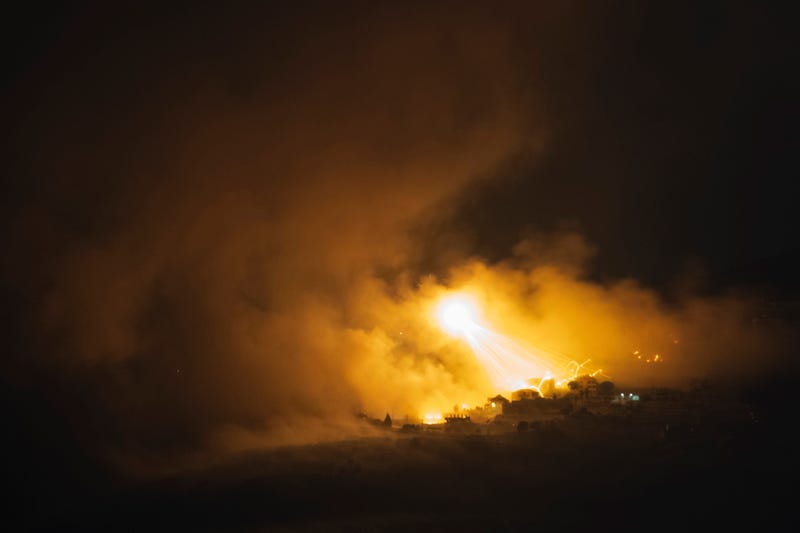
PHILADELPHIA (KYW Newsradio/AP) — Iran launched dozens of missiles into Israel on Tuesday, a sharp escalation of conflicts in the region that one journalist on the ground called “nerve-wracking.”
Iran took responsibility for the missile attack, in a statement read aloud on state television, which threatens to push the Middle East closer toward a regionwide war. There were no immediate reports of casualties.
A final number of missiles has yet to be revealed, though it’s believed somewhere around 200 were fired, according to Jordana Miller, an ABC News correspondent stationed in Jerusalem. “It was a very nerve-wracking experience,” Miller told KYW Newsradio.
Israel ordered residents to head to bomb shelters as air raid sirens sounded across the country. A series of window-shaking explosions were heard in Tel Aviv and near Jerusalem, though it was not immediately clear whether the sounds were from missiles landing or being intercepted by Israeli defenses, or both.
“I was in the safe room with my two little children and the nanny for over 50 minutes, nearly an hour,” said Miller, “and it was waves and waves of sirens followed by the sound of loud explosions, which, as it turns out, were mostly, or were interceptions.”
Israeli military officials said the country’s air defense systems, which include the “Iron Dome,” intercepted many of the incoming missiles, though some landed in central and southern Israel.
“I think it's important to note that the Iron Dome is one of a very sophisticated, multi-layered air defense system that Israel has,” said Miller, “so the ballistic missiles that were shot down were not necessarily just shot down by the Iron Dome. They were shot down by the Arrow 2 and Arrow 3 [missiles] and what's called Israel's David Sling [defense system].”
The Arrow systems, she added, were developed in collaboration with the U.S. White House National Security Advisor Jake Sullivan said the Iranian strike was ultimately “defeated and ineffective,” in part because of assistance from the U.S. military in shooting down some of the inbound missiles.
Israel vowed retaliation for Iran's missile barrage, which it said had caused only a few injuries. “This strike will have consequences,” said Rear Adm. Daniel Hagari, an Israeli military spokesman.
The statement from Iran referenced Hezbollah leader Hassan Nasrallah and Revolutionary Guard Gen. Abbas Nilforushan, both killed in an Israeli airstrike last week in Beirut. It also mentioned Ismail Haniyeh, a top leader in Hamas who was assassinated in Tehran in a suspected Israeli attack in July. It warned this attack represented only a “first wave,” without elaborating.
Earlier on Tuesday, Israel said it had begun limited ground operations against Hezbollah in southern Lebanon.
“We may just be at the beginning of a tit-for-tat, with more strikes between Israel and Iran, because Israel is making it clear that it is going to strike back, and severely,” said Miller.
Israel considers Iran to be its greatest foe — citing Iran’s repeated calls for Israel’s destruction, its support for Arab militant groups and its nuclear program. Iran denies Israeli accusations that it is developing a nuclear weapon.
The two nations have fought a shadow war for years, but rarely have they come into direct conflict. Iran launched another direct attack on Israel in April, but few of its projectiles reached their targets. Many were shot down by a U.S.-led coalition, while others apparently failed at launch or crashed in flight.
“The Israeli response [to the April attack] was somewhat muted,” said retired U.S. Army Col. Jeff McCausland, now a military consultant for CBS News.
“They went after some Iranian air defense — one site not far from a nuclear facility — and subsequently, of course, assassinated [Hamas political leader Ismail Haniyeh], who was attending an inauguration for the new Iranian president. That was partly, probably, part of that overall response. But this time, I think we're going to see a much larger-scale Israeli response.”
Miller said, while it isn’t clear when the next Israeli reprisal will come, “it appears the Israelis are not going to wait as long as they did last time. That's what we're gathering as we watch the events here and listen to different people who are also emerging from their safe rooms and talking about what's coming next.”
Israel and the United States have warned there would be severe consequences in the event of an attack on Israel from Iran, which backs the militant group Hezbollah in Lebanon. President Joe Biden and Vice President Kamala Harris monitored the attack on Israel from the White House Situation Room.
“They warned that the United States would stand by Israel [and] was not going to restrain Israel in its response,” McCausland said.
“The United States, I think, also stands by to assist Israel in its own defense. And then, finally, the United States has made it clear to the Iranians that attacks on U.S. military forces in the region, either by them or by their proxies, could likely result in an American response against Iran.”
The Associated Press contributed to this report.
